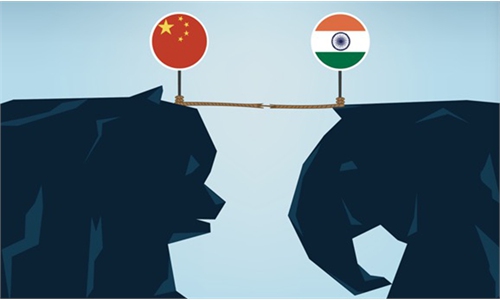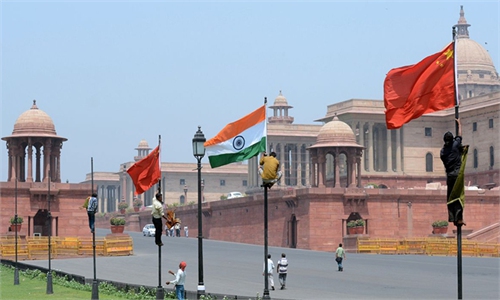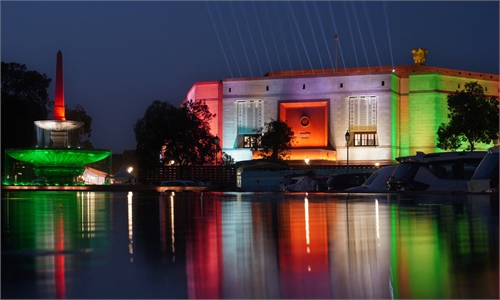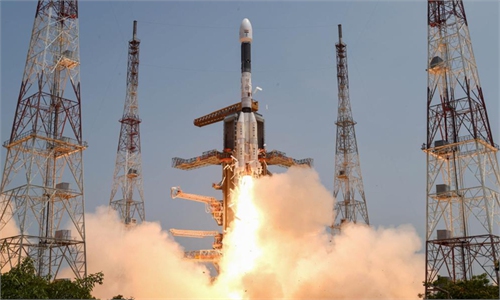US woos India to join ‘NATO Plus’ ahead of Modi-Biden meeting, harms New Delhi’s strategic autonomy
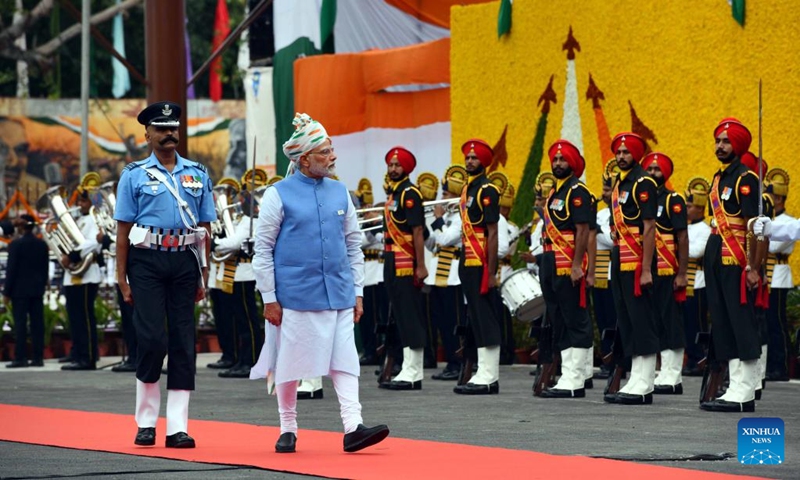
Indian Prime minister Narendra Modi inspects military guard of honor after arriving at the historic Red Fort on the occasion of India's Independence Day in Delhi, India, Aug. 15, 2022. (Str/Xinhua)
The US has stepped up efforts to woo India ahead of Indian Prime Minister Narendra Modi's visit to Washington, with its envoy to India recently hailing New Delhi as "one of Washington's closest allies," and saying India should decide whether to join US-led NATO Plus while highlighting the need to deepen defense cooperation.
Experts said on Thursday that the US' hyping of the issue is more about shaping a favorable public opinion environment for its own "Indo-Pacific" security architecture. Although India's official attitude toward NATO Plus membership remains unknown, if India makes the unwise choice of leaning toward NATO, it will cause great harm to New Delhi's strategic autonomy, international status and relations with neighboring countries, experts said.
In an interview with Indian media outlet WION on Tuesday, US Ambassador to India Eric Garcetti said that "anything is on the table" when asked to comment on a report mentioning that a US committee has recommended that India be included in the US-led NATO framework.
Garcetti said it was up to New Delhi to decide whether it wants to join NATO plus, emphasizing that India is one of Washington's closest allies. NATO Plus, currently NATO Plus 5, is a security arrangement that brings together NATO and five aligned nations - Australia, New Zealand, Japan, Israel and South Korea - to boost defense and intelligence ties.
On May 27, a US House committee adopted a policy proposal to include India in NATO Plus so as to "deter China's aggression" on the Taiwan question.
Qian Feng, director of the research department at the National Strategy Institute at Tsinghua University, told the Global Times that the US wants to replicate in the Asia-Pacific region the model of confronting Russia through the NATO framework to counter China, in which the US regards India as a key link that will determine whether its "Indo-Pacific strategy" will succeed.
India also wants to leverage the US and NATO framework to increase its influence and, to some extent, its strategic leverage with China, Qian noted.
The US' attempts to woo India came ahead of Modi's state visit to Washington DC on June 22 at the invitation of US President Joe Biden.
On June 5, US Defense Secretary Lloyd Austin will meet with his Indian counterpart Rajnath Singh in New Delhi during his seventh "Indo-Pacific" tour, where he is expected to "further deepen the US-India Major Defense Partnership," according to a release from US Department of Defense.
The possibility of India's closer cooperation with NATO in the future cannot be ruled out, but for now, India is wary of being pushed into a direct confrontation with China by the US, even if China-India relations are at low ebb due to a border standoff, Qian said.
In addition, in the case of the deterioration of US-Russia relations and the continuation of the Russia-Ukraine conflict, India will also take into account its long-term cooperation with Russia, and keep a certain distance with the US, the expert noted.
Li Haidong, a professor at the China Foreign Affairs University, told the Global Times on Thursday that by hyping India's accession to NATO Plus, which is unlikely to occur in the near future, the US is actually looking to shape a favorable public opinion and political environment, laying the groundwork for the possible establishment of a closer relationship between India and the NATO mechanism in the future, so as to further expand US influence in the Asia-Pacific region.
However, New Delhi needs to be awake to the fact that India's growing global status comes from its maintaining strategic autonomy and not taking sides, Li said. "For India, it is in its best national interest to maintain a moderate balance among the great powers."
India has always longed for leadership of the Global South. If New Delhi chooses to become part of the US entourage by leaning toward the NATO mechanism, which represents the security interests of the US and its allies, it will have a great impact on its global leadership ambitions, as well as its position as a major power and its room for diplomatic maneuvering, Qian said.
"If India takes sides, it will pose a huge challenge to its position in regional organizations like the Shanghai Cooperation Organisation, and its relations with China and Russia," Li said.

